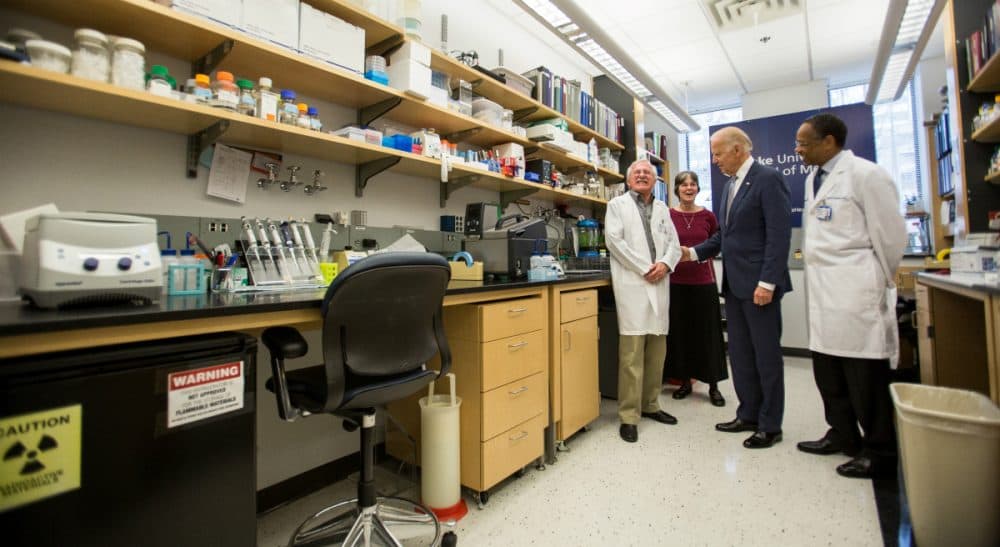Forget the Posturing – The Inflation Reduction Act May Work Better Than Many Expected
Paula Chaves da Silva & Fred Ledley | August 16, 2024

It took two years from the passage of the Inflation Reduction Act (IRA) with its provisions mandating negotiation of a “maximum fair price” (MFP) for selected Medicare Part D drugs to complete the highly scripted process of determining their prices. Over this interval, public advocates have celebrated this landmark step towards reversing the provisions of the Medicare Prescription Drug, Improvement and Modernization Act that prohibited the government from negotiating a fair price for drugs under Medicare Part D. Meanwhile the pharmaceutical industry has waged a vigorous campaign to derail price negotiations through legal challenges, lobbying, and disingenuous appeals to public opinion arguing that the IRA would cripple pharmaceutical innovation and harm, rather than help, consumers.
Give pharmaceutical execs the benefit of doubt — but they need to work for it
Fred Ledley | August 7, 2024

The polarized debate over drug pricing has generated cartoonish, sometimes colorful caricatures of the biopharmaceutical industry and its leaders. Critics of the industry have portrayed pharmaceutical leaders as ruthless, rapacious leaders who gouge patients to gratify greedy shareholders. While one might expect industry trade organizations to defend their leaders, their responses have sometimes portrayed leaders as powerless proxies of their shareholders whose product portfolios and profits would collapse if forced to negotiate a “maximum fair price” with Medicare, their largest customer. Neither characterization depicts the industry leaders I have worked with in my career or their long record of accomplishment.
Crying Wolf: Why Negotiating Lower Drug Prices Will Not Harm Pharmaceutical Innovation
Fred Ledley, Henry Dao, Cody Hyman | July 22, 2024

The two years since Congress passed the Inflation Reduction Act (IRA) have seen a barrage of commentary from both public advocates and industry debating its effect on drug prices and development. Some analysts celebrate the dawn of public representation in drug price negotiations; others bemoan the loss of shareholder control over pharmaceutical markets. All sides, though, have stepped up their efforts to achieve political influence.
The Global Pharmaceutical Industry Isn't Investing in Products for the Greatest Burden of Human Disease - Are Non-Profits a Solution?
Payal Arya, Fred D. Ledley | March 29, 2024

The World Health Organization (WHO) estimates that 1.7 billion people around the world are in need of measures to prevent or treat neglected tropical diseases (NTDs), conditions that collectively account for as many as 200,000 deaths/year and a burden of disease running in the hundreds of billions of dollars per year. This vast unmet medical need reflects the global pharmaceutical industry's focus on developing products for US markets, where efficient channels for product sales and few limits on drug pricing provide companies with the opportunity for robust returns on investment and profit. US markets, however, account for less than 4% of the global burden of disease. The greatest disease burden is associated with conditions prevalent in low- and middle-income countries, where the available market is typically inadequate to justify the investment cost; a classic instance of market failure.
How Should the Government Negotiate Medicare Drug Prices? A Guide for the Perplexed
Fred D. Ledley | March 4, 2024

Now, at last, thanks to the Inflation Reduction Act (IRA), the federal government will be allowed to negotiate a "maximum fair price" for drugs covered by Medicare Part D. This historical change, taking place in the face of intense industry opposition, incrementally reverses policies that have prohibited the government from engaging in price negotiations since Medicare Part D was first established in 2003. While only ten drugs will be subject to negotiation in the first year of the IRA and 90 over the first five years, negotiations are now ongoing.
Opinion: Who Really Pays for Drug Development? Both Government and Industry
Fred D. Ledley | July 17, 2023

There is a stark divide in public depictions of pharmaceutical innovation. The biopharma industry proudly advertises its accomplishments in launching new drugs for cancer, neurodegenerative disease, diabetes, weight loss and more without acknowledging the billions of dollars of government funding for basic and applied biomedical science that enabled these advances. Industry critics, meanwhile, argue that this government funding is responsible for pharmaceutical innovation, going as far as to propose that patients “pay twice” for medicines, once in the form of taxes that underwrite government research and again in purchasing these products.
Two recent papers published by my colleagues and me in the Journal of the American Medical Association’s Health Forum suggest that neither view is accurate. Our research illustrates the essential complementarity of government and industry spending on new medicines.
Why the big questions about drug prices are rarely asked: It’s hard to do
Fred D. Ledley | December 16, 2021

Do pharmaceutical companies have a responsibility to provide medicines to those in need, or is their primary purpose as corporations to maximize value for shareholders? Does government have a responsibility to provide medicines to the public, or is its role to incentivize companies to make medicines available by linking increased profits to the provision of important products?
Why don’t these questions get asked, so they can be answered?
Returns to Public Investment in Drug Discovery: Some Fundamental Questions
Fred D. Ledley, Ekaterina Galkina Cleary, Matthew Jackson | September 3, 2020
The COVID-19 pandemic has transformed longstanding debates about the role of the public and private sectors in drug discovery and development from questions of optimal policy to questions of life and death. On one hand, it has dramatically demonstrated the public’s dependence on biopharmaceutical companies for the discovery, development, manufacture, and distribution of drugs and vaccines that may quell the pandemic. On the other hand, the billions of dollars of public funding demanded by the private sector to pursue these products vividly illustrates the industry’s reliance on public funding for the development of products that address the public’s most pressing needs.
US Tax Dollars Funded Every New Pharmaceutical in the Last Decade

Fred D. Ledley, Ekaterina Galkina Cleary, Matthew Jackson | September 2, 2020
The escalating controversies and divisive commentaries over drug pricing and the prioritization of products that benefit from federal funding also highlight deep divides between the precepts of the public and private sectors concerning the mission of the corporation as well as the role of government in value creation and markets. These conflicts also highlight the lack of coherent policies designed to maximize the public return on taxpayer investments and ensure that the public's needs are met.
Big Pharma Wants to Pocket the Profits From a COVID Treatment You Already Paid For
Fred D. Ledley, Ekaterina Galkina Cleary, Zoë Folchman-Wagner, Matthew Jackson | July 7, 2020

Our data suggests that Gilead's considerable accomplishment in securing authorization for use of remdesivir in treating COVID-19 represents only the culminating step in a cumulative process of innovation that involved the collective action of public, as well as private, enterprise. While Gilead will likely invest several billion dollars in bringing remdesivir to market, our data suggests that the public sector, in aggregate, has already invested much more.
The Fleming Myth and the Public Sector Contribution to Discovery and Development of New Cancer Drugs
Ekaterina Galkina Cleary, Fred D. Ledley | June 2, 2020

When people think about the process of drug discovery, they often recall the "Fleming myth." The myth recounts how a solitary English physician-scientist, "tired and shaken" by witnessing soldiers dying of wound infections during World War I, discovered penicillin when a plate of bacteria in his laboratory became contaminated with a Penicillium fungus that killed the bacteria. The story continues that Alexander Fleming then used his discovery to save young Winston Churchill's life.
The story, of course, is apocryphal, and so is this simplistic allegory of drug discovery.
Op Ed: Meeting the needs of the life science industry isn't just about teaching science
Fred D. Ledley, Naomi Wernick | February 7, 2020
The workforce needs of the life science industry are not being met by initiatives that focus solely on promoting science education. Writing in the Boston Business Journal, Drs. Naomi Wernick, associate teaching professor in biology at the University of Massachusetts, Lowell, and Dr. Fred Ledley, director of the Center for Integration of Science and Industry at Bentley University argues that such strategies need to focus on attracting and retaining students with interests that span both science and business.
30 Years is Too Long to Wait for New Medicines. There are Ways to Speed Up Drug Development
Fred D. Ledley | June 6, 2018

Have you heard the oft-repeated “fact” that it takes at least 10 years from initial discovery for a new drug to enter the marketplace? Take it with a grain of salt. The drug development journey is closer to 30 years.
I’ve experienced the lag time between discovery and commercial success as the co-founder of a biotech startup, and now I study it at the Center for Integration of Science and Industry at Bentley University.
In the early 1990s, I co-founded GeneMedicine Inc., one of the first gene therapy companies. It had a successful startup, raised hundreds of millions of dollars, pioneered new product and business opportunities, and completed an initial public offering, which gave our initial investors a substantial profit.
NIH funding provides the core foundation for new drugs
Fred D. Ledley, Jennifer Beierlein | March 15, 2018
How many new drugs come from research funded by the National Institutes of Health? That was the question posed by Illinois Sen. Dick Durbin, co-chair of the Senate’s bipartisan NIH caucus, at a recent Senate hearing about NIH funding.
The short answer: all of them.
Why a 'Moonshot' to Cure Cancer Might Just Work

Fred D. Ledley | April 29, 2016
Expectations are building for major breakthroughs in cancer treatment. Philanthropists Sean Parker, Michael Bloomberg and Sidney Kimmell have collectively contributed half a billion dollars for new initiatives in immunotherapy, and President Obama has pledged a billion dollars for Vice President Joe Biden’s “moonshot” cancer initiative. Is this the time to be reaching for the moon in cancer therapy?
ViewPoint: Drug pricing is about worth, not the cost
Fred D. Ledley | October 9, 2015
High drug prices are a target for politicians. In Massachusetts, proposed legislation would limit drug prices and require drug companies to divulge research, marketing and production costs.
It is a mistake, however, to focus policy on the perceived fairness of drug prices as opposed to the value new drugs could provide. While it is critically important that patients have access to new therapies, regardless of their ability to pay, the solution to this problem must not compromise the ability of the pharmaceutical industry to address our pressing health care problems. The question is, can pricing structure encourage companies to develop products that will have the most worth to the greatest number of people?
Careers of the Future: Will You Be Able to Recognize the Next Big Thing?
Fred D. Ledley | 2014
In this final installment of our seven-week Careers of the Future Series, Fred Ledley, professor of Natural and Applied Sciences and Management as well as director of the Bentley Center for Integration of Science and Industry, explores what exactly it takes for millennial students to prepare for tomorrow's careers — including those can't even be imagined today.
College graduates in 2014 will have more than a dozen different jobs during their lifetimes, many in industries and positions that haven’t even been created today.
Why does society support science? And how to meet the expectations?
Fred D. Ledley | May 5, 2014
Public support for science is related less to the wonder of scientific discovery than the expectation that scientific and technological advances will lead to new product, jobs, and economic growth. Recent evidence suggests that these outcomes are not certain. Fred Ledley argues that the public is often promised the benefits of scientific discoveries without adequate consideration of the business challenges inherent in translating science for public benefit.
How to lie with (FDA) statistics
Fred D. Ledley | May 2, 2014
The FDA approved 27 new drugs in 2013. Is this a downward trend? Is it an upward trend? Does it suggest that the pharmaceutical industry is failing, or that genomics is finally paying dividends? We revisit Darrell Huff’s 1954 classic How to Lie with Statistics for insights into these pressing questions.
Could Human Genome Sciences have become Standard Oil?
Fred D. Ledley | December 20, 2013
Human Genome Sciences (HGS) was not a company with normal ambitions. At its inception, HGS aspired to dominate not only the field of genomic science, but also emerging markets for regenerative medicines designed to meet the needs of ageing populations. Fred Ledley asks whether HGS could have become the Standard Oil of our generation.
Why Innovation is Stuck in Slow Motion
Fred D. Ledley | October 16, 2013
Creating economic growth from the third industrial revolution
Business innovation has a problem. A recent working paper by Robert Gorden titled “Is US Economic Growth Over? Faltering Innovation Confronts the Six Headwinds” suggests that “innovation does not have the same potential to create growth in the future as in the past.”
Want a good example? Consider the most talked-about advertisement “teaser” leading up to this year’s Super Bowl titled “Kate Upton Washes the All-New Mercedes-Benz CLA in Slow Motion.” It is impossible to watch this advertisement without asking: “what’s new?”
R&D Stimulus
Fred D. Ledley | September 1, 2013
An entrepreneur’s view on the effects of GDP revisions on R&D investment and the economy
Entrepreneurs should pay attention to recent changes in the way the U.S. calculates Gross Domestic Product (GDP). The revision, which shifts research and development (R&D) from an operating expense to a fixed investment, could stimulate greater R&D spending and promote much-needed technological innovation.
Calculating the GDP has become more complex as the U.S. shifts from a manufacturing economy to a knowledge economy more dependent on the often-abstract products of innovation. The Bureau of Economic Analysis’ (BEA) definition of GDP — “the market value of final goods and services produced by labor and property within the United States during a given period” — can be problematic for entrepreneurship. This is particularly true for enterprises focused on translating emerging scientific discoveries into new products and businesses.
What Courses Matter Most in College?
Learning in unexpected places
Biotech: Not Just for Geeks
Fred D. Ledley | September 1, 2013
Business students get high marks for scientific literacy
In a down economy, biotechnology jobs are growing faster than the overall Massachusetts state economy. The numbers don’t lie, says a recent industry study:
- More than 53,000 people in the Bay State are employed in the biopharmaceutical industry
- More than 28,000 people in biotechnology collectively earn more than $6 billion per year
These are big numbers. They reflect the state’s leading role in an industry that comprises more than 70,000 establishments, employs more than 1.5 million people nationwide, and continues to grow, according to the Massachusetts Biotechnology Council.

